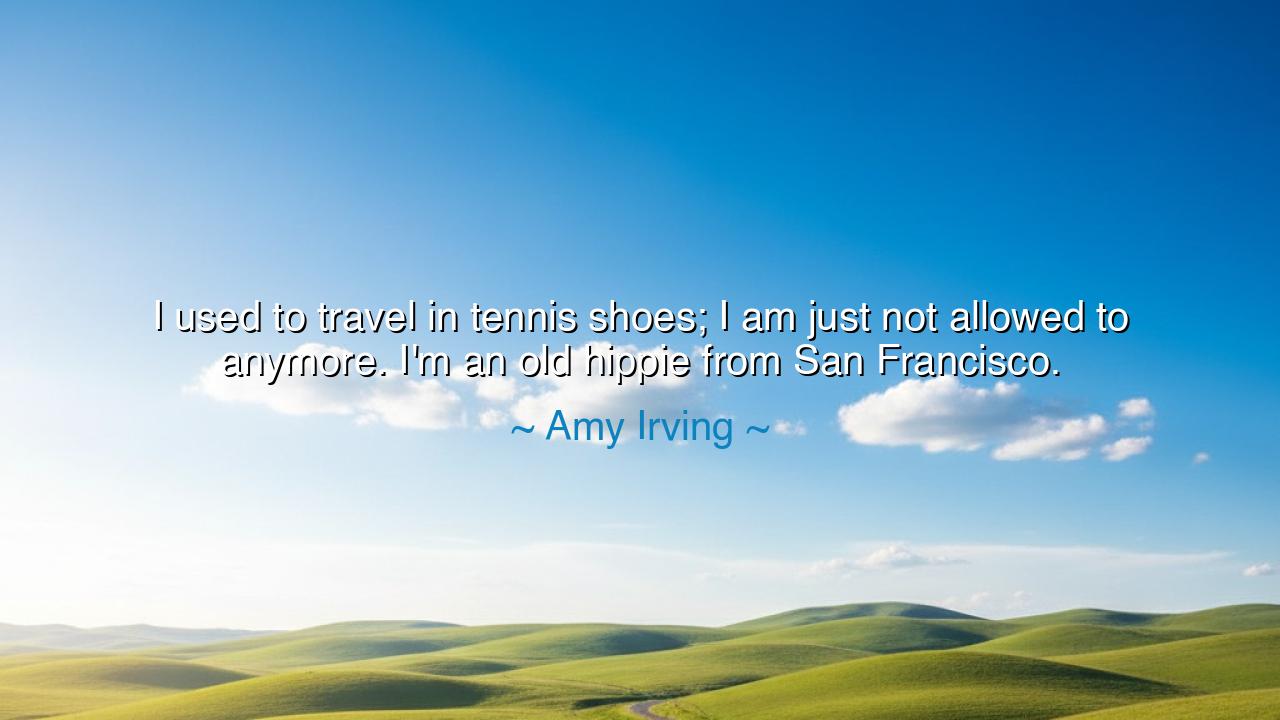
I used to travel in tennis shoes; I am just not allowed to
I used to travel in tennis shoes; I am just not allowed to anymore. I'm an old hippie from San Francisco.






Amy Irving once reflected with both humor and nostalgia: “I used to travel in tennis shoes; I am just not allowed to anymore. I’m an old hippie from San Francisco.” At first, these words seem light and playful, but beneath them lies the eternal tension between freedom and expectation, between the soul’s natural simplicity and the world’s insistence on appearances. She remembers a time when she could wander the world lightly, clothed not in fashion but in comfort, embodying the carefree spirit of the hippie, whose creed was authenticity and ease. But now, she admits, the world has pressed upon her the burden of “not allowed”—a sign that society’s judgments have power even over those who once lived outside them.
The ancients too knew this conflict. Consider the philosophers of Athens: Diogenes the Cynic, who wandered barefoot and cloaked in rags, declaring that the trappings of status meant nothing; and yet, his very rebellion drew both ridicule and admiration. The freedom to walk as one chooses, to wear what one wills, was in itself a kind of victory over the chains of custom. Amy Irving’s tennis shoes are like Diogenes’ cloak—a symbol of resistance to convention, a gesture of walking one’s own road. To lose that freedom is to feel the weight of conformity settle upon one’s shoulders.
Her words also carry the fragrance of San Francisco, cradle of the counterculture, where the hippie movement once rose like a bright flame against the darkness of war and materialism. To say she is an “old hippie” is to confess a soul shaped by an era of rebellion, by songs of peace, by marches of freedom, by an insistence that the simple path—the tennis shoe instead of the high heel—is the truest. In recalling it, Irving is not merely joking about footwear; she is invoking an entire worldview, one that cherished authenticity over appearance, freedom over constraint.
History gives us many examples of this struggle between authentic simplicity and societal expectation. Consider Mahatma Gandhi, who chose to wear the simple dhoti, spun by his own hand, rather than the suits of the British elite. His choice of dress was as radical as his politics: it declared his solidarity with the common people, his rejection of vanity, his insistence that the path of truth is simple. In Irving’s remembrance of tennis shoes, there is a gentler echo of Gandhi’s protest: the wish to live unburdened by expectation, to walk lightly and freely upon the earth.
Yet her words also reveal the sadness of time. For she says, “I am just not allowed to anymore.” The rebel of youth becomes the elder shaped by responsibility, reputation, and the gaze of others. Where once she could roam unnoticed, now she carries the visibility of fame, the expectations of society, the unspoken rules that tell her how she “must” appear. Thus, her laughter is tinged with lament: freedom fades when the world grows heavy with demands.
The lesson is luminous: do not let the weight of expectation bury your true self. Even if you must conform outwardly, do not let the spirit of your tennis shoes, your simple stride, your authenticity, be extinguished within. The world may tell you what you are “not allowed” to do, but your heart must remain free, still carrying the rebellion of youth, still carrying the joy of walking as you are.
Practically, this means holding onto small acts of authenticity in daily life. Wear what gives you peace, when you can. Live simply where others demand extravagance. Remember the ideals that shaped your youth, and let them live on in spirit, even if time and society have wrapped them in other garments. In this way, you honor both your past and your present, and you carry freedom with you, even into age.
Thus, Amy Irving’s words, half playful, half wistful, remind us that freedom is not in shoes but in the soul. The tennis shoes of her youth are a symbol of that freedom—the ability to walk lightly, to resist expectation, to live authentically. Though the world may now bind her with rules, her spirit still remembers. And so should ours.






AAdministratorAdministrator
Welcome, honored guests. Please leave a comment, we will respond soon